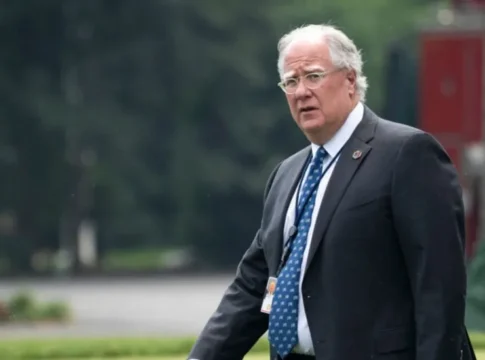This is an edition of The Atlantic Daily, a newsletter that guides you through the biggest stories of the day, helps you discover new ideas, and recommends the best in culture. Sign up for it here.
Tomorrow is Donald Trump’s deadline to agree to trade deals before he imposes tariffs, and he means it this time. Why are you laughing? (In fact, since saying that yesterday, he’s already chickened out with Mexico, putting the “taco” in, well, TACO.)
But the president has already written off hopes of reaching agreements with some allies. Yesterday, Trump announced that he was raising tariffs on many Brazilian goods to 50 percent across the board, as retribution for Brazil’s prosecution of former President Jair Bolsonaro, a Trump ally. This morning, Trump wrote on Truth Social that Prime Minister Mark Carney’s decision to recognize a Palestinian state “will make it very hard” to strike a deal with Canada.
The president’s perpetual caving can make him seem craven and opportunistic, but you can detect a different impulse in his handling of trade policy too: a warped kind of idealism. When Trump began his political career, he said he would put “America First,” rather than using American power to enforce values overseas. Wars to fight repressive autocrats were foolish ways to burn cash and squander American lives. The promotion of human rights and democracy were soft-headed, bleeding-heart causes. Trump, a man of business, was going to look out for the bottom line without getting tangled up in high-minded crusades. Now that’s exactly what he’s doing: using trade as a way to make grand statements about values—his own, if not America’s.
This is troubling on legal, moral, and diplomatic levels. The Constitution specifically delegates the power to levy tariffs to Congress, but legislators have delegated some of that capacity to the president. Trump has invoked the International Emergency Economic Powers Act, which allows him to impose tariffs in response to an “unusual and extraordinary threat,” on the basis that Congress cannot act quickly enough. This use of the law is, as Conor Friedersdorf and Ilya Somin wrote in The Atlantic in May, absurd. The White House’s months of vacillation on its tariff threats since make the idea of any emergency even less credible.
Understanding why Trump would be sensitive about Bolsonaro’s prosecution, which stems from Bolsonaro’s attempt to cling to power after losing the 2022 election, is not difficult—the parallels between the two have been often noted—but that doesn’t make it a threat to the United States, much less an “unusual and extraordinary” one. Likewise, Canadian recognition of a Palestinian state is unwelcome news for Trump’s close alliance with Israel, but it poses no obvious security or economic danger to the U.S. A Congress or Supreme Court interested in limiting presidential power could seize on these statements to arrest Trump’s trade war, but these are not the legislators or justices we have.
Setting aside the legal problems, Trump’s statements about Brazil and Canada represent an abandonment of the realpolitik approach he once promised. Even if Carney were to back down on Palestinian statehood, or Brazil to call off Bolsonaro’s prosecution, the United States wouldn’t see any economic gain. Trump is purely using American economic might to achieve noneconomic goals.
Previous presidents have frequently used U.S. economic hegemony to further national goals—or, less charitably, interfered in the domestic affairs of other sovereign nations. But no one needs to accept any nihilistic false equivalences. Trump wrote in a July 9 letter to Brazilian President Luiz Inácio Lula da Silva that the case against Bolsonaro was “an international disgrace” and (naturally) a “Witch Hunt.” Although the U.S. has taken steps to isolate repressive governments, Trump’s attempts to bail out Bolsonaro are nothing of the sort. The U.S. can’t with a straight face argue that charging Bolsonaro is improper, and it can’t accuse Brazil of convicting him in a kangaroo court, because no trial has yet been held.
The U.S. government has also long used its power to bully other countries into taking its side in international disputes, but the swipe at Canada is perplexing. The Trump administration remains the most stalwart ally of Israeli Prime Minister Benjamin Netanyahu (notwithstanding some recent tensions), and the U.S. government has long withheld recognition of any Palestinian state as leverage in negotiations. Even so, slapping tariffs on Canada for a symbolic decision such as this seems unlikely to dissuade Carney or do anything beyond further stoking nascent Canadian nationalism.
This is not the only way in which Trump’s blunt wielding of tariffs is likely to backfire on the United States. Consumers in the U.S. will pay higher prices, and overseas, Jerusalem Demsas warned in April, “the credibility of the nation’s promises, its treaties, its agreements, and even its basic rationality has evaporated in just weeks.” But it’s not just trust with foreign countries that the president has betrayed. It’s the pact he made with voters. Trump promised voters an “America First” approach. Instead, they’re getting a “Bolsonaro and Netanyahu First” government.
Related:
Here are three new stories from The Atlantic:
Today’s News
- President Donald Trump’s tariffs are set to take effect tomorrow as his administration scrambles to finalize trade deals with key partners. Mexico received a 90-day extension, while other countries, including China and Canada, remain in negotiations.
- Steve Witkoff, Trump’s special envoy to the Middle East, and Ambassador to Israel Mike Huckabee will visit Gaza tomorrow to inspect aid distribution as the humanitarian crisis worsens in the region.
-
About 154,000 federal workers accepted buyouts offered by the Trump administration this year, according to the government’s human-resources arm.
Dispatches
- Time-Travel Thursdays: The rise of the cheap, daily newspaper in the 19th century remade how Americans engaged with the world, Jake Lundberg writes.
Explore all of our newsletters here.
Evening Read
Remarkable News in Potatoes
By Katherine J. Wu
For decades, evolutionary biologists pointed to such examples to cast hybridization as hapless—“rare, very unsuccessful, and not an important evolutionary force,” Sandra Knapp, a plant taxonomist at the Natural History Museum in London, told me. But recently, researchers have begun to revise that dour view. With the right blend of genetic material, hybrids can sometimes be fertile and spawn species of their own; they can acquire new abilities that help them succeed in ways their parents never could. Which, as Knapp and her colleagues have found in a new study, appears to be the case for the world’s third-most important staple crop: The 8-to-9-million-year-old lineage that begat the modern potato may have arisen from a chance encounter between a flowering plant from a group called Etuberosum and … an ancient tomato.
Tomatoes, in other words, can now justifiably be described as the mother of potatoes.
More From The Atlantic
Culture Break

Take a look. These photos capture moments from the 2025 World Aquatics Championships in Singapore, where more than 2,500 athletes from over 200 nations competed in events spanning six aquatic sports.
Read. In 2022, Sophia Stewart recommended six books that all music lovers should read.
Rafaela Jinich contributed to this newsletter.
When you buy a book using a link in this newsletter, we receive a commission. Thank you for supporting The Atlantic.





